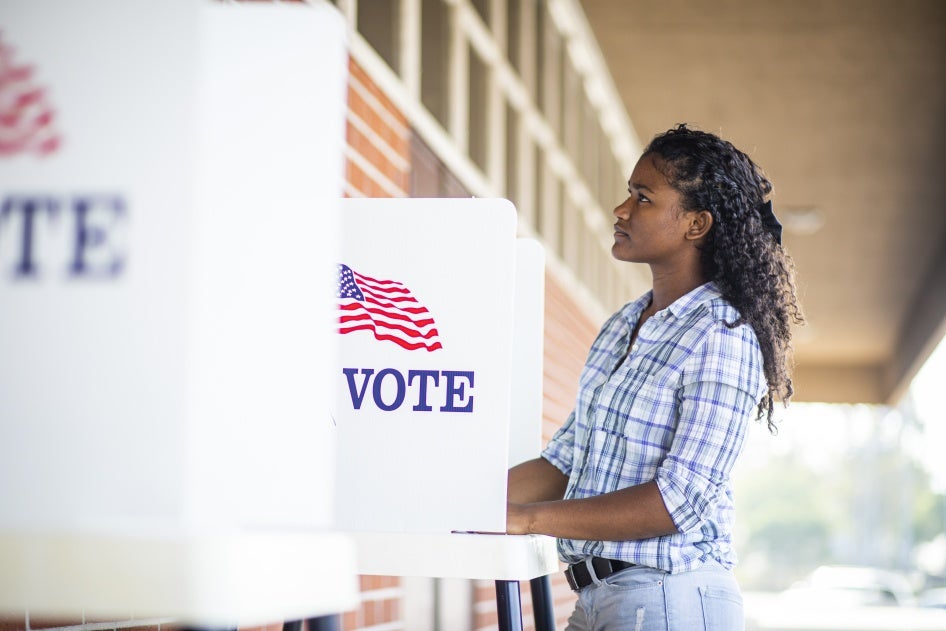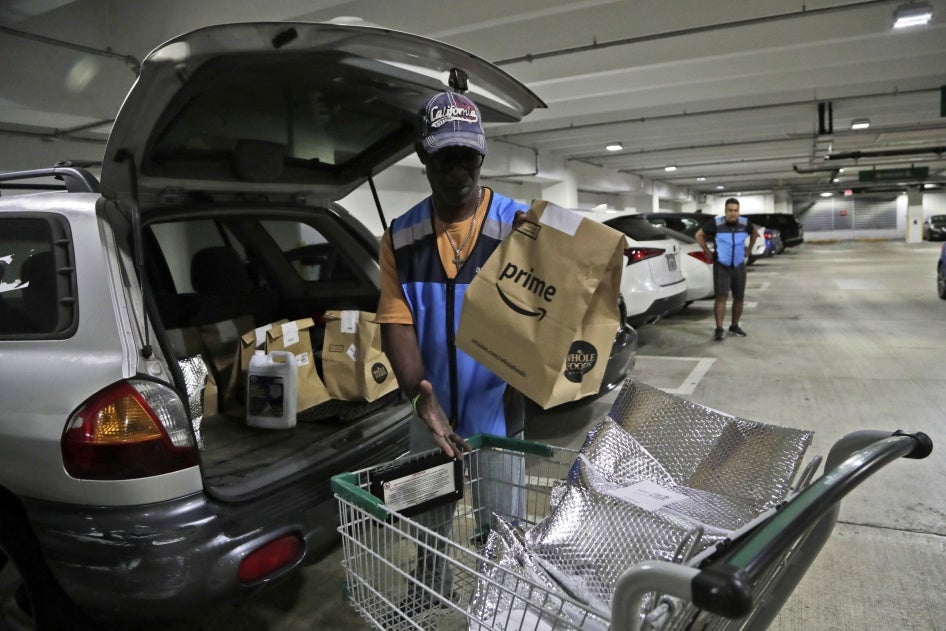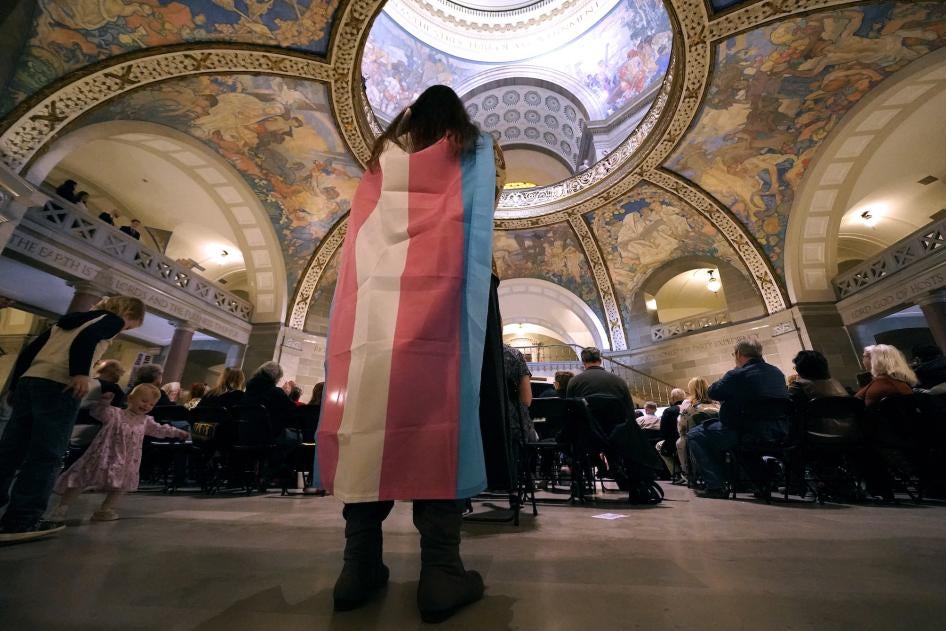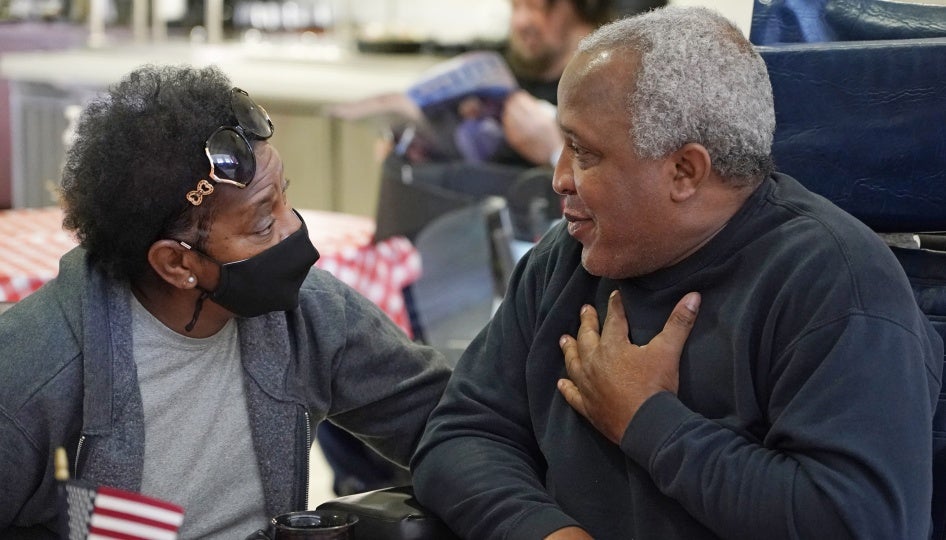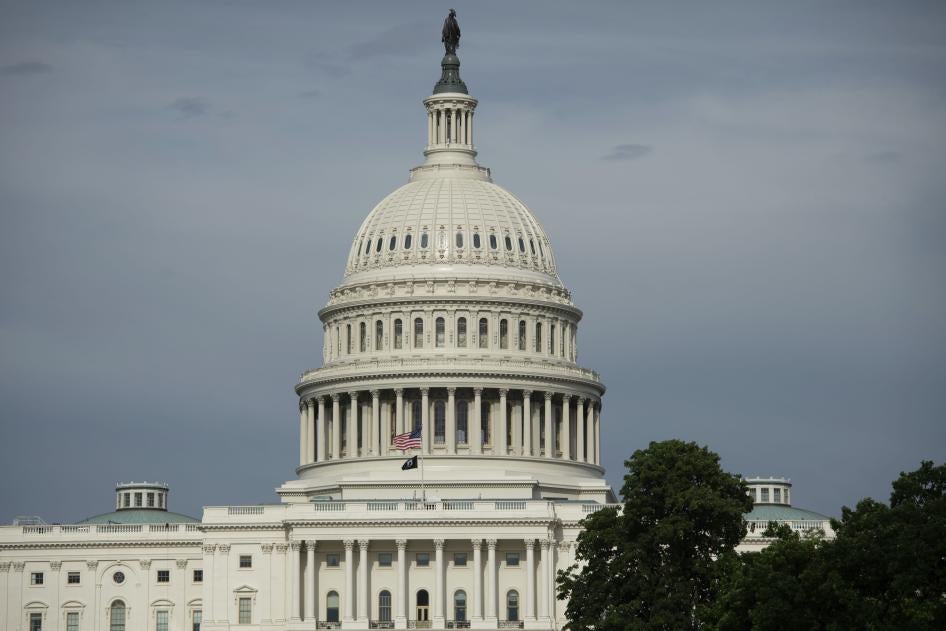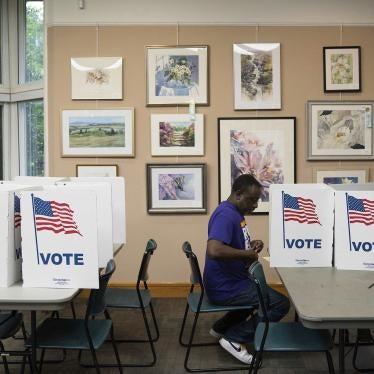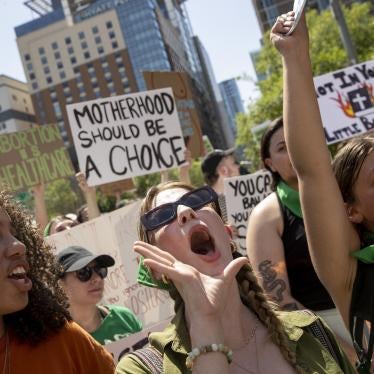In every election, human rights matter. From local schoolboard elections to presidential elections, voters have the chance to choose candidates who will fight for all people’s human rights, not work to undermine them.
Candidates should put basic human rights front and center. And voters should insist on it, in the questions they put to candidates on the stump and in the choices they make at the ballot.
The policy recommendations in this guide, crafted with a particular eye to US Congressional and presidential elections in 2024, address a wide range of both domestic and foreign policy issues. By supporting policies that advance human rights, candidates and voters help the US honor its international obligations to its people, win respect for the US on the world stage, and safeguard democracy for all.
People throughout the United States should have access to quality health care, a clean and sustainable environment, and decent schools where their children have the freedom to learn based on curricula developed by teachers and subject matter experts rather than legislators. They should also receive equal treatment at work regardless of how they look or who they love, be treated with dignity when they cross borders seeking safety, and not live in fear of law enforcement. They should not face arbitrary barriers to casting votes and should have reason to be confident their votes will count, rather than be nullified by those seeking to subvert the electoral system.
The United States has a lot of work to do to live up to these principles at home, and it should play a positive role beyond its border, guided by its human rights commitments.
Will candidates ensure infrastructure projects benefit marginalized communities? Address the racial wealth gap and other barriers Black, Brown, Indigenous, and other people of color face in obtaining housing, education, and employment? Carry out foreign policy while upholding international laws? Commit to tackling the climate crisis and phasing out fossil fuels?
During the 2024 elections, Human Rights Watch urges all candidates, regardless of party or affiliation, to tell voters how their policies will protect and advance the human rights so central to everyone’s lives. And we urge voters to consider candidates’ commitment to rights when they vote.
HUMAN RIGHTS AT HOME
Racial Justice
Support reparations. The United States’ long history of racial discrimination continues to harm Black and Indigenous people. These communities suffering from racial harms have the right to effective remedies, including reparations. Candidates should publicly support efforts to confront systemic racism, including by supporting passage of both House Resolution (HR) 40 and Congresswoman Cori Bush’s proposed House Resolution to establish a commission to study the impacts of slavery and its legacies.
Commit to international human rights standards in fighting racial discrimination. At the height of the Civil Rights Movement in 1966, the United States signed the International Convention on the Elimination of All Forms of Racial Discrimination. By ratifying the convention in 1994, the US committed to imposing effective measures to amend, rescind, or nullify all laws that have the effect of creating or perpetuating racial discrimination. Yet nearly 50 years later, compliance with the convention is insufficient. There remain widespread income disparities across racial lines, discrimination in housing, and gaps in educational outcomes. In June 2023, a US Supreme Court ruling rejected affirmative action in university admission processes, with potentially dire consequences for students of color. Candidates should give their full support to the antidiscrimination measures called for by the convention.
Criminal Justice
Address racial disparities in incarceration rates. State and federal jails and prisons in the US hold over 2 million people, and the US incarceration rate is the highest in the world. Another 4.4 million people are on probation or parole. Black people make up 13 percent of the US population but approximately 33 percent of those incarcerated. Latinx and Indigenous communities also continue to experience disproportionately high incarceration rates. During the first year of the Covid-19 pandemic in 2020, the country experienced an unprecedented reduction in incarceration rates, but the decarceration disproportionately benefitted white people and has since reversed course. We urge candidates to educate themselves and the public on the historical and structural causes of these disparities and devise an agenda that includes both federal reforms and effective incentives for state and local authorities to end abusive policing; excessive, disproportionate penalties; and systemic racial discrimination.
Reduce law enforcement footprint, invest in communities, ensure accountability. Very often police reform discussions in the United States focus on changing tactics that contribute to deaths by police. Killings are only the tip of an iceberg of coercive and often violent daily police interactions with Black, Latinx, Indigenous, poorer people, and people with disabilities. Such interactions result in high rates of arrest and criminalization, contributing to mass incarceration. Candidates should support initiatives that dramatically reduce the use of police to solve societal problems in line with the recommendations in our Roadmap for Re-imagining Public Safety in the United States. This includes ending unnecessary arrests, especially for conduct related to houselessness and poverty, like loitering and trespassing, and for conduct that should not be criminalized at all, like the possession of drugs or sex work.
Candidates should instead call for evidence-based policies and investments aimed at addressing the structural causes of violence and inequality, including permanent affordable housing, robust violence intervention programs, non-carceral crisis response mechanisms, and accessible and culturally appropriate voluntary treatment programs. Making this shift—along with establishing effective and independent oversight bodies and the necessary legal tools to ensure accountability—is essential to limiting the police violence that continues to harm communities.
End reliance on abusive pretrial detention systems. When arrests occur, support limiting pretrial incarceration to exceptional cases. The broad use of pretrial incarceration punishes people who have not been convicted; often leads to job loss, family separation, and suspension of education; pressures people to plead guilty regardless of actual guilt; and is often applied in a highly discriminatory way. Candidates should call for abolition of money bail, oppose discriminatory algorithmic risk assessments in place of money bail, and press instead for individualized hearings before anyone is imprisoned pending trial.
Children’s Rights
End child labor in agriculture. Agriculture is the deadliest industry for child workers in the US, yet labor law allows children as young as 12 to work legally on farms of any size for unlimited hours, as long as they don’t miss school. In contrast, all other sectors set 16 as the basic minimum work age and allow 14- and 15-year-olds to work for limited hours in certain jobs. Candidates should publicly call for amendments to the federal Fair Labor Standards Act to eliminate exemptions that allow children to work in agriculture at much younger ages, for longer hours, and under more hazardous conditions than any other industry. Important bills include the Children’s Act for Responsible Employment and Farm Safety (CARE Act) and Children Don’t Belong on Tobacco Farms Act. Candidates should also support updates to the list of hazardous occupations prohibited for children under 16, in line with recommendations from the National Institute for Occupational Safety and Health (NIOSH).
Ensure digital literacy and data protection for children. In 2021, an estimated 9.1 million children—17 percent of all US schoolchildren and 28 percent of those living in poverty—lived in households without broadband internet. The embrace of online learning has also allowed education technology, or “EdTech” companies, to collect massive amounts of children’s educational data, exposing names, home addresses, behaviors, and other highly personal details to the risk of misuse. Candidates should recognize digital literacy and access to the internet as indispensable to children’s education and commit, if elected, to press for affordable, reliable, and accessible internet service and capable devices for all students. Candidates should also commit to strengthening data protection laws for children and requiring school districts to include data privacy clauses in contracts with Ed Tech providers to protect data collected on children from misuse.
Protect children in contact with the criminal legal system. The United States is the only country in the world to sentence children to life without the possibility of parole. In the US, children, disproportionately children of color, are routinely prosecuted as adults, given excessive sentences, needlessly incarcerated, and denied services and opportunities designed to help them thrive in the community. Candidates should signal their commitment to work with states and other authorities to prohibit life without parole sentences for child offenders, end the transfer of children to adult courts, and accelerate initiatives to establish community-based alternatives to detention.
Immigrants & Border Communities
End policies that deter migration through deadly means. The US approach to managing its southern border focuses on prevention through deadly deterrence tactics—a failed US policy that marks its 30th year in 2024—and on unlawfully blocking people from pursuing their right to seek asylum. Candidates should call for reversal of the Circumvention of Lawful Pathways rule (known as the “asylum ban”), expanded access to asylum, and an end to deadly deterrence-only strategies toward migrants that have contributed to an increasing number of deaths and disappearances of people forced to cross in more dangerous and remote regions of the border.
Implement policies that protect human rights at the border. For a fraction of the billions of taxpayer dollars spent on militarizing the US-Mexico border, the US could invest instead in creating rights-respecting reception centers at ports of entry. To help ensure the right to seek asylum in the US, candidates should oppose rights-abusive criminalization and deterrence policies and call instead for increased investment in a welcoming and rights-respecting US border. They should support provisions to that end contained in proposed legislation and amendments, including the Federal Accountability for Law Enforcement Act, the Refugee Protection Act, and A New Way Forward Act.
Create pathways to citizenship. Candidates should support extensive immigration system reform to allow long-term immigrants to gain citizenship, expand safe and lawful pathways to migrate, and increase investment in humane border reception policies. They should oppose unnecessary and arbitrary detention and electronic monitoring of migrants, and support community-based case management programs for those with pending proceedings.
Stop federal support for state programs that violate immigrants' rights. Several US states unlawfully target migrants and asylum seekers for abuse. Candidates should call on the administration to exercise its oversight responsibilities to end the abuse, including by sending civil rights observers to Texas to document rights violations that result from Operation Lone Star (OLS), requiring Customs and Border Protection to end its participation in OLS-related operations, and working with Congress to halt federal funding of OLS.
Ensuring Free and Fair Elections
Ensure the right to vote without discrimination or discriminatory effects. Given the long US history of discrimination against Black and Brown people that has limited their ability to exercise the right to vote, authorities throughout the United States should ensure voting procedures do not have discriminatory effects, particularly on Black, Latinx, and Indigenous communities, and people with disabilities, among others. Candidates should support provisions in the proposed John Lewis Voting Rights Advancement Act that would require states and counties with histories of racial discrimination to have voting changes approved by the US Justice Department or federal judges.
Prevent voter intimidation and violence by extremist and other groups before, during, and after the elections. Officials at all levels and candidates for office should publicly condemn groups and individuals seeking to intimidate, harass, or incite violence against voters and other members of the public, including on the basis of race, color, national origin, gender, gender identity, sexual orientation, religion, or disability. They should seek to prevent such intimidation and violence, including near polling places and during protests. Law enforcement authorities should promptly and thoroughly investigate violence against candidates, elected officials, voters, election officials, and others, and hold abusers accountable. Government agencies and officials, as well as others who effectively wield governmental authority or exercise effective control over territory and population, have a duty not to engage in any speech advocating violence, discrimination, or hostility toward any individual or social group.
Prevent misinformation and disinformation regarding elections. Government officials should provide reliable and trustworthy information about electoral processes and not make, sponsor, encourage, or disseminate information about the electoral process which they know to be false, or that demonstrate a reckless disregard for verifiable information. Social media platforms have a responsibility to respect human rights and mitigate harm—such as incitement to violence—resulting from their business practices. Platforms should publish clear, pre-determined policies governing content moderation, respect minimum due process guarantees, and give users access to remedies.
Access to Information and Democratic Participation
End disenfranchisement based on criminal legal system contact. Denying a person their right to vote because they were convicted of a crime or have had other contact with the criminal legal system violates international human rights law. The United States has the highest rate of incarceration in the world, a badge of dishonor that disproportionately impacts Black and brown communities. Millions of these individuals have temporarily or permanently lost the right to vote. Candidates should support the full restoration of voting rights for all citizens, regardless of their contact with the criminal legal system. They should also back efforts to ensure unpaid fines and fees and driver's license revocations do not block low-income individuals from voting.
Protect students’ freedom to learn. Lawmakers have recently undermined democratic norms in the United States by banning books and passing laws that restrict truthful classroom discussions of race, history, sexual orientation, and gender identity, violating human rights treaties. Freedom of expression includes the right to seek, impart, and receive information of all kinds, and to non-discrimination in the enjoyment of that right. This includes a right to learn about historical injustices and human rights. Children also have a right to comprehensive sexuality education, which can save their lives and ensure their health and well-being. Candidates should propose measures to ensure every student has access to truthful history, including the history of Black Americans in the United States. Candidates should also propose measures to protect educators from negative consequences—firing or penalties—for teaching such subjects.
Economic Justice
Allocate resources toward universal social protection. Covid-19 highlighted the importance of robust and universal social protection programs. The expiration of the expanded child tax credit, for example, contributed to a dramatic increase in child poverty. The poverty rate for US children increased from a historic low of 5.2 percent in 2021 to 12.4 percent in 2022, erasing all the record gains made against child poverty over the previous two years. Social security continues to be one of the most impactful economic justice programs in the US, lifting nearly 30 million people out of poverty each year. Candidates should call for expansion of the country’s social protection systems with the aim of ensuring universal social protection.
Invest in public services and regulate healthcare system. Public services are essential to human rights. These government institutions and policies manage and provide the goods and services necessary for realizing many rights, including health care, education, housing, transportation, energy, water, and more. However, the chronic US underinvestment in public services and heavy reliance on poorly regulated private markets to fill this gap have led to soaring costs in housing and health care, which undermine human rights, particularly for people with low incomes. Candidates should oppose harmful cuts in social spending at home and abroad, and instead commit to delivering high-quality public services for all.
Technology and Human Rights
Tackle tech company surveillance. The US lacks a human rights-centered federal data protection law, leaving private personal data open to abuse by both state and corporate actors, particularly commercial tech companies with advanced data collection, profiling, and targeting capabilities. Candidates should advance a strong data protection law as a priority.
Regulate artificial intelligence (AI). Congress is considering multiple bills to regulate AI and related technologies, while the White House has released a new Executive Order on AI. Candidates should oppose abusive applications of AI, such as predictive policing and facial recognition in public spaces. They should call for mandatory human rights impact assessments prior to the development and procurement of all AI systems and support effective remedies for people harmed by such systems.
Implement protections for platform workers. Workers recruited by ride hailing and delivery platforms experience low and unpredictable wages, stemming from the use of secretive algorithms to set pay rates. Workers can also be fired by the platform’s algorithms, with little meaningful opportunity to appeal. These abusive practices are enabled by the misclassification of platform workers as independent contractors, which excludes them from most wage and labor protections under federal and state law. Candidates should support the reform of employment misclassification laws and join calls for additional safeguards against algorithmic mismanagement, such as independent processes to appeal automated firings.
Limit abusive spyware. The US government has taken steps to limit the global proliferation of commercial spyware, including via a 2023 Executive Order and joint statement. Candidates should commit to further limiting the spread of the abusive global spyware industry, including through binding regulation and use of sanctions against companies responsible for, or complicit in, serious human rights abuses.
Rights-based regulation of platforms. Social media companies are a source of many human rights concerns, including freedom of expression and safety concerns arising from platforms’ overbroad removal of political dissent and failure to adequately moderate abusive content. Candidates should endorse strong transparency requirements for social media platforms and strong human rights due diligence requirements for such companies’ global operations.
Climate Change Policy and Impacts
Phase out use of fossil fuels. To uphold human rights obligations, candidates should commit to bold, clear, ambitious, and immediate action to tackle the climate crisis, including a full phase out of all fossil fuels. Candidates should support environmental and climate justice to advance human rights at home and abroad. Fossil fuels are the primary driver of the climate crisis that is taking a mounting toll on human rights. All stages of fossil fuel use—exploration, extraction, production, storage, transport, refining, combustion, and disposal—can be linked to human rights harms. These impacts perpetuate systemic racism and are disproportionately borne by already marginalized communities, including Black, Indigenous, and other people of color and low-income communities.
Expand the Inflation Reduction Act. Candidates should support expansion of the Inflation Reduction Act, the most significant action on clean energy and climate change taken by the US Congress, and the Bipartisan Infrastructure Bill, which supported increased public transit and clean energy power infrastructure. They should also support several Executive Orders that advance environmental justice and climate justice, including Justice40, delivering 40 percent of the overall benefits of federal climate, clean energy, clean water, and other investments to marginalized communities overburdened by pollution. Heatwaves, hurricanes, and other extreme weather events linked to climate disproportionately impact marginalized populations, warranting additional policies to protect at-risk populations, including people of color, low-income communities, pregnant people, people with disabilities, and older people.
Support global climate reforms. Candidates should support the full funding of international financial mechanisms that support low-income countries in climate adaptation, mitigation, and just transition. They should also support tighter emissions limits in the US national climate plan: current emissions targets are not sufficient to meet the Paris Agreement goal to limit global warming to 1.5°C above pre-industrial levels.
Reproductive Health
Address racial disparities in maternal health. The US has a disturbingly high maternal mortality rate, and high preterm birth rate, both driven to a significant degree by social and economic inequality. All candidates should provide detailed information about how they will combat growing inequities in maternal, and other sexual and reproductive, health between white women and women of color, especially Black and Indigenous women. Candidates should ensure they include cervical cancer inequities in their plans for addressing reproductive injustice in the US, including details on how they will ensure efforts to end racism in the healthcare system, education, and equitable access to prevention, screenings, and cervical cancer care, including in healthcare deserts.
Protect pregnant people from harmful environmental impacts. The climate crisis is harming maternal and newborn health. Candidates should support and commit to funding efforts by community health workers, activists, and others working to combat the harm through improved maternal health, environmental justice, and racial equity.
Ensure access to abortion care. The US Supreme Court’s overturning of the constitutionally protected federal right to abortion has made access to safe abortions more difficult. At the time of writing, abortion is restricted in 21 states, and 14 states have taken measures to criminalize healthcare providers who perform abortions. Some states also made it a crime for anyone, including healthcare providers, to assist pregnant people in obtaining an abortion. Candidates should publicly support efforts to address the needs of approximately 22 million women and girls of reproductive age, as well as other people who can become pregnant, who now live in US states where abortion access is heavily restricted or totally inaccessible. They should also publicly support efforts by the US Department of Justice, as well as the manufacturer to make the drug mifepristone available for medical abortions.
Sexual Orientation and Gender Identity
Implement policies that protect the rights of transgender people. Candidates should offer concrete solutions to protect the rights of LGBT people, and particularly transgender people, in the face of legislative attacks. They should explain how they will use their office to ensure transgender people are able to obtain identification documents that reflect their gender identity; access affordable, respectful healthcare services they need, including gender-affirming care; use bathrooms and other facilities consistent with their gender identity; utilize domestic violence shelters and homeless shelters in a crisis; and secure education, employment, housing, and public goods and services without discrimination.
End targeting of LGBT children in schools. Candidates should oppose restrictions on discussions of sexual orientation and gender identity in schools—recognizing that students benefit when they are able to discuss with their families, learn about diversity, and receive comprehensive sexuality education over the course of their education. Candidates should ensure rhetoric around parental rights is not misused to deprive children, including LGBT children, of their freedom of expression and freedom to access information.
Support local nondiscrimination laws to protect LGBT people. At both the federal and state level, candidates should commit to supporting comprehensive nondiscrimination legislation that is inclusive of sexual orientation and gender identity where it does not exist. In particular, candidates for Congress should commit to supporting the Equality Act, which would prohibit discrimination based on sexual orientation and gender identity in education, employment, housing, public accommodations, credit, and federally funded programs. Candidates should also explain how they will strengthen and enforce existing laws and regulations designed to combat discrimination, particularly if robust federal legislation is not forthcoming or states continue to enact hostile laws.
People with disabilities
Implement alternative ways to address mental health crises. Candidates should publicly support or propose policies to ensure police methods do not negatively impact individuals with disabilities, especially those with mental health conditions. In particular, Black or Latinx individuals are disproportionately affected by aggressive policing methods. The common practice of sending police as first responders, including for “wellness checks,” increases the risk of injury or death particularly for people with disabilities, including those with autism, intellectual disabilities, and mental health conditions. Candidates should support policies that champion community-based responses to individuals experiencing mental health crises that are consent-based, nonmedical, trauma-informed, and focused on harm reduction. These initiatives should ensure police are not the first responders to these calls, and focus on offering warm, non-coercive methods to support the recovery of individuals experiencing a mental health crisis.
Rights of Older People
End inappropriate use of antipsychotic drugs in nursing homes. In 2018, every week, more than 179,000 people in nursing homes in the US were given antipsychotic drugs even though they had not been diagnosed with any condition for which use of the drug is approved. The Centers for Medicare and Medicaid Services (CMS) committed in January 2023 to audit the appropriateness of nursing homes’ schizophrenia diagnoses to reduce the misuse of antipsychotic drugs to control behavior—known as chemical restraint. The use of antipsychotic drugs in older people with dementia can have debilitating side effects and nearly doubles the risk of death. Candidates should speak out against the practice.
Increase staffing levels in nursing homes. Nursing home staff and administrators reported understaffing influenced their ability to provide sufficient and consistent support to residents during the Covid-19 pandemic. To address staff shortages, the Centers for Medicare and Medicaid Services has proposed minimum nursing home staffing levels of only three hours of direct care per resident per day, which falls short of studies that recommend over four hours. Candidates should support measures that help ensure nursing homes have appropriate staffing to provide necessary care.
HUMAN RIGHTS IN US FOREIGN POLICY
Use of force
Since the 9/11 attacks, the United States has expanded its counterterrorism operations around the world. The US public has little idea where US forces are, what they are doing, and what covert actions are taking place in their name.
In any armed conflict, US forces and personnel have an obligation to abide by the laws of war, which require taking all feasible steps to protect civilians from the hazards of armed conflict. Outside situations of armed conflict, US forces have an obligation to abide by international human rights law, which places greater restrictions on the use of force, especially regarding the taking of human life or other harm.
Since 9/11, all US administrations have skirted many of these obligations. This has resulted in human rights violations—including torture, extrajudicial killings and disproportionate civilian casualties—and damaged US credibility around the world. The US Central Intelligence Agency (CIA) has repeatedly carried out lethal targeting of terrorism suspects outside of conventional battlegrounds, with virtually no transparency or accountability.
Candidates should insist on US forces and personnel fully meeting all international standards, including:
- Upholding international human rights and humanitarian law, whether in peacetime or during armed conflict.
- Never authorizing or permitting torture or other ill-treatment, which is illegal at all times under international law.
- Ensuring the US is not complicit in serious abuses committed by foreign forces and acts to promote accountability of foreign forces.
- Taking all feasible steps to prevent or minimize civilian harm in US military and other operations, investigating and holding accountable those responsible for abuses, and providing redress or making amends for harm caused.
- Stopping lethal targeting in violation of international law by the CIA and other intelligence agencies.
Candidates should also support ratification of treaties that limit or ban certain weapons that cause significant human suffering. They should publicly oppose US transfer of cluster munitions to other countries and publicly support signing the international treaties banning the use of cluster munitions and antipersonnel mines.
International Justice
Accountability for violations of international law is crucial to stopping cycles of violence and abuse, and to building respect for the rule of law.
The US government advanced justice by providing resources to the International Criminal Court’s investigation into alleged war crimes by both parties in Ukraine. Candidates should indicate they are dedicated to promoting justice for grave international crimes, no matter where they are committed or by whom. This could include committing to work toward having the US join the ICC’s Rome Statute and stand with 123 other member countries to pursue justice for the most serious international crimes.
Candidates should also commit to addressing past US violations of international law to ensure they do not happen again and to dignify and provide redress for the victims. There has been no adequate reckoning with torture, unlawful renditions, and other grave crimes committed by US officials during the “global war on terrorism.” As a start, candidates should say:
- The Guantanamo Bay detention facility needs to close, and those held there be safely released or appropriately prosecuted in the US.
- Torture will never be authorized or supported.
- Civilians harmed by US operations should be recognized and provided redress or offered amends.
Atrocity prevention and response
The United States has led the world on developing policy and tools for atrocity prevention and response with the 2019 passage of the Elie Wiesel Genocide and Atrocities Prevention Act and the 2022 US Strategy to Anticipate, Prevent and Respond to Atrocities.
Candidates should support application of these policies and tools, early, robustly and equally across the numerous countries at risk or currently experiencing atrocities.
Defending Human Rights with Global Allies
Allies of the United States should not get a free pass on failing to uphold human rights obligations. Human rights should be considered alongside economic and security interests as policymaking priorities.
Strong public and private diplomatic messaging when abuses occur can push governments to change course. US public messaging condemning abuses helps protect human rights defenders. Additionally, being clear that the US government is willing to call out abuses—whether by friends or foes—builds the legitimacy of rule of law.
Candidates should publicly support:
- Speaking bluntly with allies around the world about their human rights abuses, while ensuring the United States is addressing its own abuses at home as a model.
- Assessing the human rights record of potential recipient countries before deciding on military aid, weapons sales, or other security assistance.
- Never giving human rights abusers the “red carpet” treatment at the White House.
- Using targeted sanctions against foreign officials and others who have engaged in serious human rights abuses.
- Enforcing US and international law to curb human rights abuses around the world, like those banning the import of goods linked to forced labor in Xinjiang and elsewhere.
- Standing with human rights defenders by speaking out when allies or adversaries threaten them and supporting them with other practical assistance as appropriate.
- Countering foreign governments’ restrictions on civic space, including clampdowns on free speech in traditional and social media; repression by security forces, including of marginalized groups; and abuses cloaked as countering terrorism, maintaining public order, or responses to national emergencies.
- Seeking the release of political prisoners and information on people who have been forcibly disappeared.



